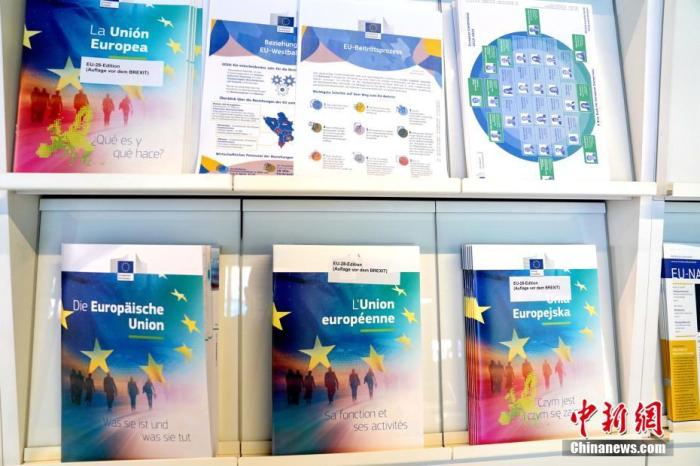China News Service, July 2 reported that on July 1, Germany officially took over the six-year rotating EU presidency. At present, the EU is facing a serious economic crisis due to the new crown epidemic. German Chancellor Angela Merkel said that she will promote a large-scale economic recovery plan. She and the entire German federal government are determined to do everything they can to support "we move forward together as Europeans" .
Germany calls for EU unity to recover
Later on June 30, local time, Germany slogan "Unite and promote European recovery" on the Brandenburg Gate of Berlin's iconic building.
On July 1st, local time, the Berlin, Germany landmark Brandenburg Gate was laid with the national flags of Germany, the European Union, and Croatia, and the flag that symbolizes Germany as the rotating presidency of the European Union. On that day, Germany formally took over the rotating presidency of the EU, starting a half-year term. China News Service reporter Peng Dawei
During the day on July 1, Croatian Foreign Minister Radman and German Foreign Minister Maas, who had just resigned from the EU presidency, passed the "relay baton" symbolizing the rotating presidency in front of the Berlin landmark Brandenburg Gate.
"Germany took over the six-month rotating EU presidency at a difficult time today. Our presidency will of course be popularized by the new crown, branded by the fight against the epidemic and overcoming its impact." Merck Said.
Merkel will step down as German chancellor in 2021. Germany’s Der Spiegel Weekly wrote that serving as the EU’s rotating presidency is Merkel’s “last chance” to make himself one of Europe’s most prominent leaders, adding that as the EU’s largest country and largest economy, it is now Germany’s responsibility It's time for more responsibility.
What are the challenges of "helming" the EU?
"It is no exaggeration to say that we are facing the biggest economic challenge in EU history," Merkel said in his most recent speech.
Merkel has been in power for 15 years and is the longest-term leader in the EU. In 2007, Germany served as the president of the EU rotating country. But this time Merkel's challenge is even more difficult.
On July 1st local time, a multilingual manual on the situation in the European Union was placed in the visitor center of the European Commission Representative Office in Germany in the center of Berlin. On that day, Germany formally took over the rotating presidency of the EU, starting a half-year term. China News Service reporter Peng Dawei
The first major test will appear at the EU summit on July 17-18. Merkel hopes that leaders of various countries can reach an agreement on the 750 billion euro recovery fund proposed by European Commission President Von Delaine.
The funds will be provided to the EU countries most affected by the new crown epidemic, such as Italy and Spain. Among them, 500 billion euros are for free appropriation, and 250 billion euros are for loans. But countries including Austria and the Netherlands want to control expenditures and do not agree to free appropriation.
Another challenge is Brexit. After Britain left the European Union in January 2020, the two sides originally planned to sign a trade agreement before the end of the transition period at the end of the year, but at present, the negotiations are still standing still.
Merkel said in a question in Congress on the 1st that the EU needs to make preparations in advance to deal with the hard Brexit situation after the trade agreement is not negotiated. Merkel promised that he would try his best to find a solution for the European Union and the United Kingdom during the rotating chairmanship for the next six months and complete the negotiations before the fall. But she admits that the progress is "really limited".
U.S.-Germany relationship cools sharply
When Germany sought unity from the EU countries, its relations with the United States deteriorated rapidly.
On July 1, local time, photos of the members of the European Commission were displayed in the visitor center of the European Commission Representative Office in Germany in the center of Berlin. On that day, Germany formally took over the rotating presidency of the EU, starting a half-year term. China News Service reporter Peng Dawei
The differences between the United States and Germany are manifested in many fields such as economy, politics, diplomacy, and security. The US Department of Defense said on June 30 that US President Trump has approved plans to cut 9,500 US troops in Germany.
In addition, Russia’s natural gas pipeline project through the Baltic Sea to Germany also encountered opposition and sanctions from the United States.
In terms of trade, Trump has always criticized Germany and the EU for not treating the United States kindly. He threatened to impose tariffs on European car imports, which will seriously affect Germany, which is the home base of European car production.
German Foreign Minister Mas recently said that the alliance with the United States is of great significance in many ways. But even if Trump’s opponent, the Democratic candidate, visits the White House, the deteriorating virtue relationship can no longer be restored to his former state.

